Alphabetically by instructor. Also see the workshop schedule.
This page is being updated as information becomes available.
Deb Essen
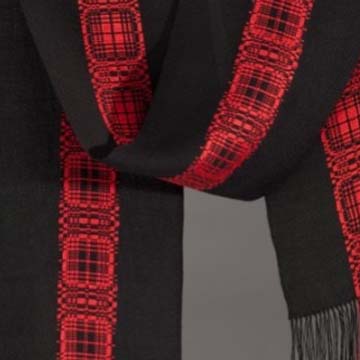
Weaving with Supplemental Warps without a Second Beam
This class is an introduction to weaving supplemental warps for turned drafts without a second back beam. Supplemental warps are additional warps used to create pattern and/or texture running the length of the textile in your weaving. Tips, tricks and techniques will be shared to give you a firm foundation for supplemental warp weaves. Intermediate to advanced weavers.
Students should bring: 4- or 8-shaft loom with or without second back beam, 1 shuttle, sley hook and threading hook, scissors, tape measure, any other weaving tools you need. 2 warp weights—items that work well for weighting warps: deep water fishing weights (6 or 8 oz each), film canisters with washers or pennies for weight, kumihimo braiding weights. NO sand or water filled containers! Wooden dowel approx. 12 in. long and ½ in. in diameter, 2 sheets scrap paper (8½ x 11), masking or painters tape, and two warps. Warp instructions will be sent via email to students about a month before the workshop.
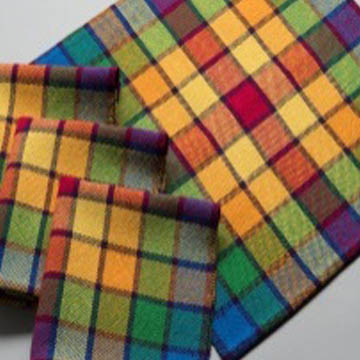
Color for Fiber Artists
You bought some beautiful yarns to use together in a project. In the skeins or cones, the colors just sing to you. However, when you start knitting or weaving, the results are less than stellar. This class will explore color theory and definitions to start training our eyes (and brain) to learn what colors will play well together and why. Beginner…and beyond!
Students should bring: color wheel (if you have one), 3–4 yarns you feel would work well together, paper/pen.
Jane Fournier
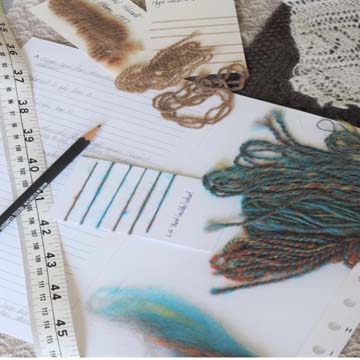
Spinning with a Purpose
Even though, for us, spinning is a labor of love, we nevertheless want those hours of work to result in a finished product worthy of all that devotion. In this workshop, we’ll address this expectation in two ways. First, we’ll focus on equipping your toolbox with hands-on practice and discussion of the options you have at each step of creating a yarn—fiber selection, preparation, drafting methods, and plying. Next, we’ll work on when and how to deploy those tools and techniques to complete projects that are as satisfying as they are beautiful. Using your own project ideas, we’ll work through the planning, decisions, and calculations that will allow you to confidently translate your ideas into reality.
Instructor will provide:
• All the fibers necessary for the workshop
• Printed handouts
Materials Fee: $15
Students should bring:
• Spinning wheel in good working order (spindle spinners are also welcome to bring fine and medium weight spindles if they would like to use them)
• At least 4 bobbins and a lazy kate or other arrangement for plying. Note: for this class it is important to have a means of holding bobbins for plying so that they can be positioned away from your spinning wheel. A simple box, such as a shoebox, with knitting needles poked through the sides to hold the bobbins is perfectly satisfactory if you don’t yet have a lazy kate.
• Fine and medium handcards, if available (there are usually plenty in the class for sharing if you don’t have these yet)
• Flick carder and/or comb if you have them
• Small ruler (a 6-inch ruler is easiest to handle but the length isn’t critical) or yarn gauge
• Notebook, pen or pencil, scissors, and small niddy-noddy (for making sample skeins) are all useful but not essential
• Project idea or ideas that you can use as an example for the workshop exercises
• Any fibers you would like to experiment with as part of the project exercises (optional)
Maximum of 16 students
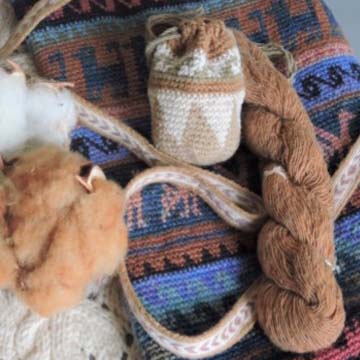
Spinning Cotton
Soft, silky, durable, and absorbent, cotton has been a textile staple for different cultures around the world for millennia. We will study some of the various types and breeds of cotton available for handspinning along with their physical properties and spinning characteristics. Learn preparation methods and efficient drafting techniques that will allow you to tackle cotton and any short-stapled fiber with ease. We’ll also cover blending, yarn structure, and plying so that you can spin cotton yarns suitable for a variety of textile techniques.
Instructor will provide:
• All the fibers necessary for the workshop
• Printed handouts
Materials Fee: $10
Students should bring:
• Spinning wheel in good working order. If you have a choice of wheels, one with high ratios will be most efficient. (spinners are also welcome to bring lightweight spindles or a charka if they would like to use them).
• At least 3 bobbins and a lazy kate or other arrangement for plying.
• Fine handcards, if available (there are usually plenty in the class for sharing if you don’t have these yet)
• Small ruler (a 6-inch ruler is easiest to handle but the length isn’t critical) or yarn gauge
• Notebook, pen or pencil, scissors, and small niddy-noddy (for making sample skeins) are all useful but not essential
• Any cotton fiber that you have questions about or would like to try spinning in class (optional)
Maximum of 16 students.
Jenny George
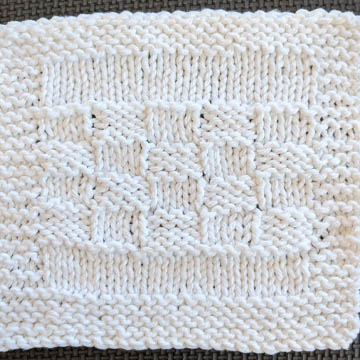
Intro to Beginner’s Knitting
With this washcloth project, you will learn a knitted cast-on, a knitted stitch, and a purl stitch along with instructions for creating a basket weave using these two stitches. Instructions for casting off to create a nice finished edge will also be covered.
Materials fee: $15.00, includes pattern, yarn, knitting needles, markers, scissors, counter, and other accessories. All of the supplies are a real bonus for a beginning knitter.
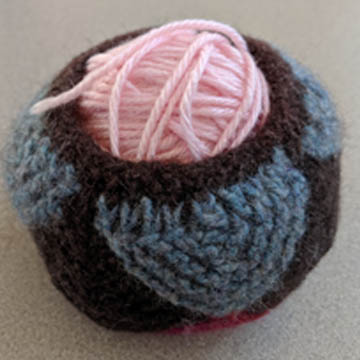
Knitted and Felted Miter Bowl
These fun bowls are knitted all in one piece so there is no sewing required. They have multiple uses, like holding that runaway ball of yarn you’re trying to knit, or catching that static fiber off your fingertips while spinning. This class will teach you the basics of the bowl’s sides, cornering, and edging, so you can go home and create your own larger bowl, basket, or purse. Intermediate knitters
Students should bring: size 8 knitting needles and several colors of wool yarn that will felt.
Materials fee: $ TBA for instruction booklet.
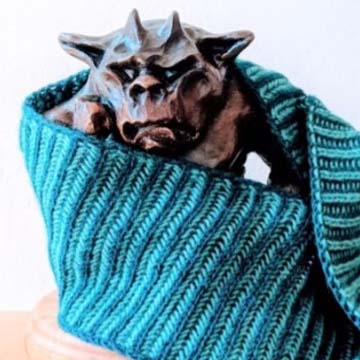
Brioche Knitting
Explore the world of Brioche Knitting in the round. This is a technique that is simplified with the help of an in-person teacher. This new technique will create a beautiful cowl with two very different looks. It’s like getting two garments in one! Advanced knitters
Class fees: $2.00 includes pattern
Students should bring:
• 100-110 yds of worsted weight yarn color A.
• 100-110yds of worsted weight yarn color B.
Please use very contrasting yarn colors for this will simplify your work in progress.
• 16-inch circular US size 8 (5.0mm) needle for cast on and bind off
• 16-inch circular US size 6 (4.0mm) needle for the body of the cowl
• Stitch marker for the beginning of round (please no dangling ones.)
There will be homework before class which will give you more time to get the brioche technique down.
Karen Griffing
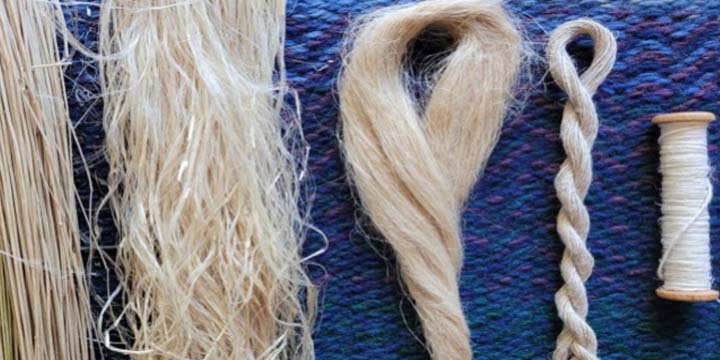
Flax Processing and Spinning
ONE SPOT AVAILABLE!
This class will cover the basics of flax as well as provide hands-on use of flax processing tools. We will learn what flax is (structure and properties), how to grow it and get fibers out (planting and harvesting, steps in processing), how to spin it (dry and wet, strick vs. sliver vs. rolag, in a towel or on a distaff), and how to wash the yarn. Spinners will be provided with flax top to spin in class.
In the afternoon we will take some retted flax through the processes of breaking, scutching, and hackling. We can then spin the tow flax and discuss options for dressing a distaff with the line flax.
Materials fee per student: $15, includes
• Flax fiber to spin – approximately 2 ounces each of bleached and unbleached
• Fiber flax seeds – 1 ounce
• Sponge and small container for wet spinning
• Small bunch of retted flax to process
• Class handout
The instructor will bring flax break, scutching board and knife, and hackles for shared use by students, and a distaff for demonstration.
Maximum of 10 students.
Students should bring:
• Spinning wheel with empty bobbin
• Towel to place on lap
• Hand carders
• Dust mask (a covid mask works fine)
• Optional: small side table, note-taking and sample-labeling supplies, your own chair or spinning stool
Joanne Hall
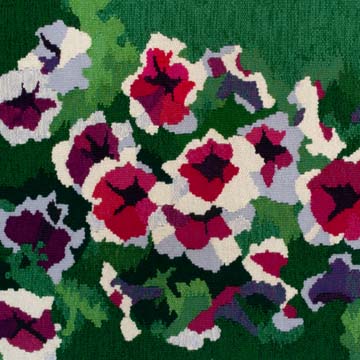
Tapestry Weaving
THIS CLASS IS FULL
Tapestry weaving is a technique that lets you express your ideas and creativity with color, shapes, and lines. This workshop is designed to help you develop your skills in tapestry. Weave a sampler of techniques on a tapestry frame, made available to you for the class. All supplies are provided with many yarn colors to make your sampler colorful and fun to weave. Finishing and hanging instructions included, as well as the confidence to take tapestry to new levels! Beginners, and beyond.
Students should bring: A notebook for taking notes and pencil.
Materials fee: $35.00, includes use of the frame loom, all the warp and weft materials, handouts, and miscellaneous supplies.
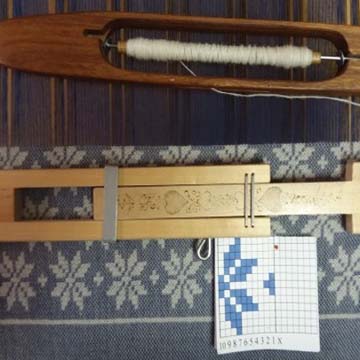
Introduction to Drawloom Weaving
THIS CLASS IS FULL
Class will be held at Joanne’s studio
Weaving on a drawloom is fun, and easier than you thought! Five looms will be warped and ready for you to experience this fascinating way to weave, including both damask and opphamta, the two most popular weaves for drawloom weaving. Both setups will achieve patterns and designs which are larger and more distinct than what an ordinary, threaded loom pattern can produce. Once you have woven on the looms in this class, you will have an understanding of the unlimited pattern possibilities at your fingertips. Intermediate weavers and beyond. Must be able to follow treadling instructions, weave with treadles, use one or two boat shuttles and follow a graph paper pattern.
Students should bring: all materials provided
Materials fee: $30.00, includes drawloom book, materials used for weaving, use of looms and equipment.
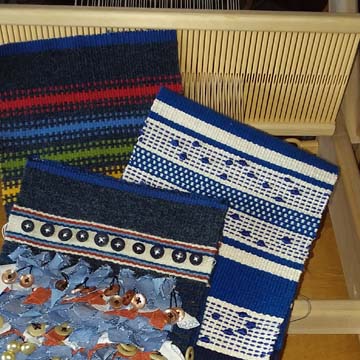
Rigid Heddle Weaving, a Fun Place to Begin
ONE SPOT AVAILABLE!
This is a great opportunity to learn the basics of rigid heddle weaving. Weaving on a rigid heddle loom is fun and easy. These looms are small and portable and your weaving can be as simple or as complicated as you like. Enjoy learning about color, design, and texture with
easy techniques on a rigid heddle loom. Looms will be provided, ready for weaving. A demonstration of how to put the yarn on the loom will also be included. Sources of information for continuing your weaving journey will be provided. No experience necessary.
Maximum 12 students
Students should bring: Scissors, note taking materials
Materials fee: $20, includes of a pre-warped loom and supplies needed for weaving. Yarns will be provided and the weaver will take home their woven sample.
Tammy Jordan
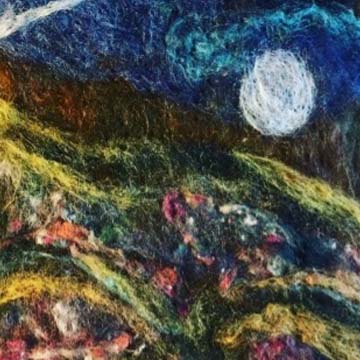
Woolen Watercolors: Painting With Wool
THIS CLASS IS FULL
Come create your very own masterpiece while learning to paint with wool. We’ll start with needle-felting your design, building color and textures, and then we’ll finish it off with a steam wet-felt before matting and framing your work. I’ll provide everything you need, including colored fiber, felting needles, foam mats, picture mat, and frame; you just bring your love of color and a willingness to learn and create! No prior painting or needle-felting experience needed.
All supplies provided by instructor.
Students should bring: their love of color and a willingness to learn; their own favorite felting needles if they want.
Materials fee: $15.00, includes everything students need to create one Woolen Watercolor in class. Kit includes colored fiber, felting needles, foam mats, picture mat, frame and resource guide. Additional kits will be available to purchase at the end of class
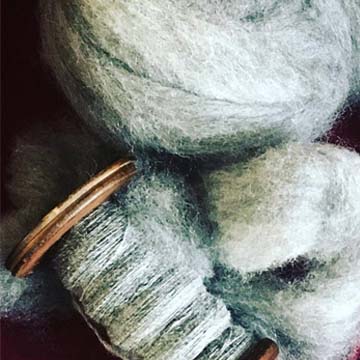
Montana Fiber Tasting
In this fun and informative three-hour class, enjoy a fiber tasting from locally sourced Montana wool. You’ll learn breed and wool characteristics for each of five breeds—Targhee, Romney, Alpaca, Merino, and Suffolk—along with the best way to prep each fiber and what it’s best suited for. We’ll round out the class with test spinning each of the fibers. Students must be able to spin a consistent single on their own.
Maximum 15 students
Students should bring:
their wheel or spindle, curiosity about local wool, questions, and a smile.
Materials fee: $20, includes 1 oz of prepared spinning fiber from each of five breeds (5 oz total), and a detailed resource guide
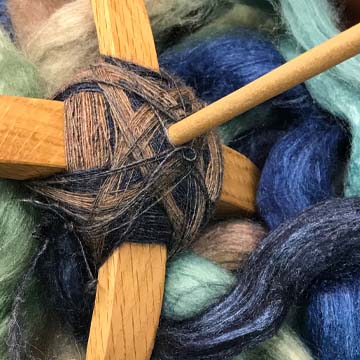
Spinning with a Turkish Spindle
THIS CLASS IS FULL
Have you ever been intrigued by the Turkish spindle and wanted to know what the hype was all about? In this
3-hour class, you’ll learn the basics of spinning on a Turkish Spindle. We’ll cover a little bit of spindle history, why the Turkish spindle is so appealing, spinning and winding methods, and how to ply from your
“spindle created center-pull ball.” No experience required —beginners welcome!
Maximum 10 students
Students should bring:
A smile, and any questions they may have. They can bring their own spindle if they like, but not required.
Materials fee: $10, includes 2oz. of spinning fiber and resource materials and the use of a Turkish spindle. Students will have the option at the end of class to purchase the spindle used in class for a fee of $25.
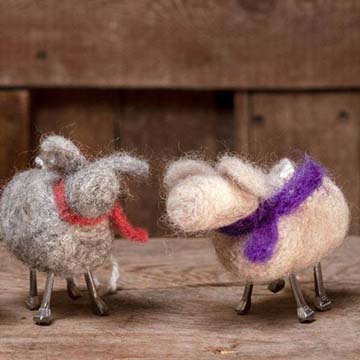
Needle-Felted Sheep Ornaments
Do you love sheep and wish you could have some of your very own? Well, I can’t promise a real sheep, but these needle-felted sheep ornaments are the next best thing. In this three-hour fun and interactive workshop, you will create your very own festive and decorative needle-felted sheep ornaments. Choose from white or brown local Montana wool from my own flock of sheep to make your ornaments. You will have time to complete one ornament in class and have the materials to complete an additional ornament at home, or in class, if time permits.
Materials fee: $15, includes a needle-felted sheep kit—fiber, felting needles, horseshoe nails, glue, yarn, hanger, and a felting mat.
Linda Kubik
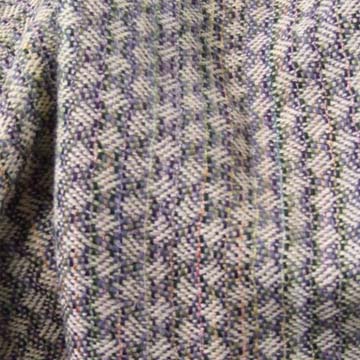
Fiber—Yarn—Fabric
Quality fabric starts with quality fiber. This class focuses on natural fibers, exploring their complexity and diversity. This is an interactive hands-on class. Everyone will receive a packet of various natural fibers and yarns. We will discuss spinning and how it affects the yarn and the fabric structures as well as examining many types of commercial yarns and how they relate to fabric structure and hand. Learn to recognize the perfect marriage of fiber, yarn, and fabric. Fast-paced class with lots of samples and handouts.
Maximum 30 students
Students should bring: note-taking materials and scotch tape.
Materials fee: $30, includes handouts and samples
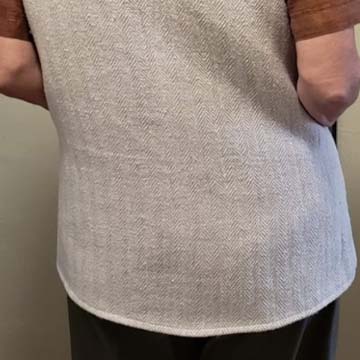
Edge and Seam Finishes
“Homemade is only good when it come from the kitchen!” Our goal is to create quality handmade items. Learn to make seam and edge finishes unique to handwoven fabric which take custom garments from handmade to haute couture. Everyone will go home with their own set of reference samples and instructions to review and use. We will also cover needles, thread, interfacing and pockets as time allows.
Students should bring: a sewing machine, thread and scissors
Materials fee: $50, includes handout and supplies
Maximum 20 students
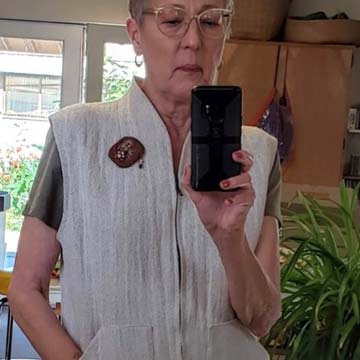
Sewing with Handwoven Fabric: The Quintessential Northwest Vest
Everyone needs a vest or two to throw on by itself or as an extra layer. Construct the perfect lined vest with standing collar, front zipper, and large handwarmer pockets. The vest is longer in back for added protection. Since all participants will be using the same pattern, suggestions for making each one unique will be given. Students need to be familiar with clothing construction.
Materials fee: $20
Instructor will supply the pattern and stay tape.
Instructor will have different types of interfacing available for sale. Class will cover fitting, alterations, and fabric prep including, lining and interfacing.
Maximum 20 students
Student should bring:
• All sewing supplies, scissors, shears, good quality-preferably cotton thread, colored pencils, clear ruler, tape measure, ham, clapper
• Steam iron and board, old tea towels for press cloths
• Sewing machine in good working order (I do not do repairs)
• Dress form, if available. Guild will provide several dress forms for use along with ironing boards and irons
• 2-3 yards of handwoven fabric and sufficient lining
• Rotary cutter and mat, if available
• 18-in or 20-in separating zipper
Trudy Moffett
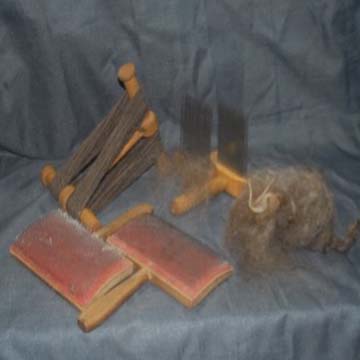
Beginner’s Spinning
Explore the age-old art that figures in fairy tales and discover the fun of spinning yarn on a wheel. You’ll learn the fibers and tools, the purpose of combs and carders, and study the mechanics of the wheel. Skilled spinner Trudy Moffett will show you how to use a short backward draw, how to use a drafting zone, how to apply the correct tension, and how to ply your singles. And she’ll teach you the lingo, too.
Materials fee: $15.00, includes syllabus and spinning materials
Instructor will provide:
• Spinning wheels
• Combs
• Carders
• Fleece and roving materials for spinning
If the student has a working spinning wheel, they may bring it to use
Maximum 7 students
Liz Moncrief

Crackle Weave’s Magic and Mysteries
This class is comprised of fundamentals of the crackle structure, drafting using computer enhanced draw-downs, and hands-on weaving using a multitude of treadling combinations. Crackle is very gregarious and she likes to visit all the other major weave families, so you’ll learn something of twills, summer & winter, overshot, and lace in the process. Each student will be given the same draft and we will weave a minimum of ten samples using different treadlings and tie-ups.
This is an excellent opportunity to learn and understand components of weave structures such as tied weaves, two-tie and double two-tie, and to apply them to a basic crackle draft. This is meant to be a 4-shaft weaving class, however if students request, I can provide 8-shaft drafts. Drafts and instructions will be sent out to participants well ahead of time. All levels of weavers are welcome so long as they can warp their loom and be prepared for the workshop.
Maximum 16 students
Students should bring: looms prepared with warp, 2-3 shuttles, several bobbins/quills or pirns pre-wound with weft yarns, scissors, threading hooks and darning needles (not required but helpful) note-taking supplies, at least one bobbin winder for the group.
Materials fee: $8.00, includes extra yarns for fun, my detailed booklet/handout to cover subject matter and instruction
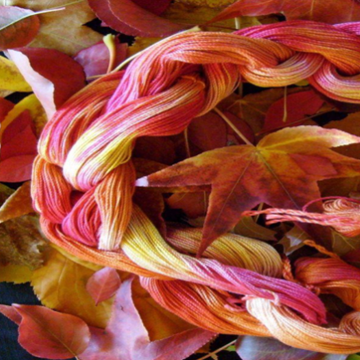
Painting for an Artisan Scarf
This is my longest-running and most popular one-day workshop because who doesn’t love color? Whether you’re a subtle, natural-shades person or flamboyant and outrageous, we’ll satisfy your need for creativity and expression.
This workshop is open to all fiber artists and we use reactive dyes, designed for easy application on all cellulose fibers: cotton, rayon (which includes Tencel and bamboo), and all bast fibers (linen, banana, ramie). We focus on warp painting for weaving, although non-weavers may bring in cellulose-based yarns for other purposes.
All warps or skeins must be wound and washed before the workshop and I will give instruction to all participants well before the class. It is suggested that each participant bring four to five warps or skeins as we will demonstrate and reproduce a minimum of five techniques to allow for a wide range of fun results.
Because the curing process for this class of dyes is 20-24 hours, I will also give full instructions on handling the yarn packages the next day, including rinsing, washing, and drying. Beginning to advanced fiber workers will enjoy the new horizons offered in this class
Maximum 14 students
Students should bring: 4-5 pre-wound and washed warps of 2-3 scarves each (must be cellulose, no wool or silk); a medium-sized plastic bag or bucket to carry bundles home, old towel, old cloths, aprons are handy, snacks to share if they’d like
Materials fee: $18.00, includes instructor’s detailed booklet on use of dyes and application methods, Reactive dyes (I have a wide range of 40+ colors/hues to choose from), chemical waters, mordants, gloves
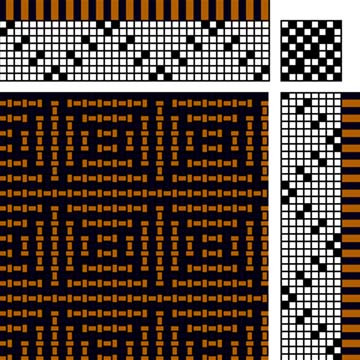
Introduction to the Marvelous World of Computerized Drafting
This workshop uses a major drafting program available for download onto your own system—Fiberworks PCW. This class is an INTRO to computerized drafting, to dazzle the new weavers and bring them onboard. Intermediate users will pick up new tricks, too.
We begin with the very basics of loading and opening the program, and will work on threading, tie-up, treadling, using color, cutting/pasting, and using numerous short-cuts to make drafting a breeze. I will send instructions out well ahead of time for downloading a demo version of this program, or participants can use their own if they have one. I will always offer my time on emails or zoom afterwards to handle special questions.
DRAFTING YOUR DREAM TEAM: This part of the class offers an emphasis on one or two specific, but well-known, weaving drafts and how to turn them into something magic using drafting tools. We expand, contract, change the size of threads, cut/paste, and colorized to dazzle.
TURNING IT: Come along this short journey and discover why ‘turning’ is such a valuable tool and why you should use it or not. This ‘mini’ class will be included in the day-long program. New weavers to advanced. Some computer skills are helpful.
Maximum 24 students
Students should bring: a laptop or notebook computer, with mouse or stylus (touch screen is extremely clunky)
Windows-based system is best but a Mac is doable. Demo program should be downloaded before the session. I will bring flash-drives with the program, but I prefer not to take class time for this.
Materials fee: $8.00, includes written/printed handouts to cover session subjects
Laurel Orthmeyer
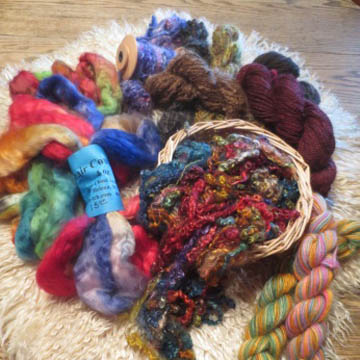
Dyeing on the Farm
Spend a day playing with color! Travel to Laurel Orthmeyer’s farm, only 10 minutes from town, and hug the baby goats, pet the horses, and dye some yarn/fiber. We will kick the day off with an ice-dyeing project which uses fiber reactive dyes and discuss how they differ from acid dyes. Switching over to the acid dyes, we will cover kettle dyeing—both solid and variegated—dip dyeing, hand painting, solar dyeing, and crockpot dyeing. No previous experience is necessary.
Students should bring: wear old clothes; bring several gallon ziplock bags to take wet projects home, plastic tub with a lid and a grate (plastic or stainless) that fits inside, folding camp chair, any yarn/fiber that students might want to dye in addition to the yarn/fiber provided, 2 small lingerie bags (used for washing delicates). Please email instructor if you need assistance with supplies. orth@in-tch.com
Materials fee: $30.00, includes 6 small skeins protein fiber yarn (wool, alpaca, etc), 1 skein bast fiber (cotton, linen), 4 oz. wool roving/top, and cost of dyes.
Bev Polk
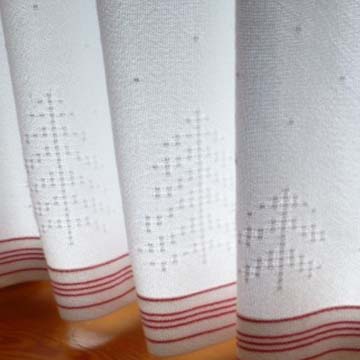
Bronson Lace Pick-Up for Designing Weavers
We’ll use a 4-harness Bronson Lace threading, in which you can pick up and weave designs and “pictures”—words, birds, flowers, vines, trees, etc.—of lace on a plain weave background. Make wonderful window curtains, runners, pillowcase borders, and other handwoven items for your home or for special gifts. The designs are worked out on graph paper ahead of time. You only need basic weaving knowledge and to bring a loom threaded and ready to go. I will email participants well in advance with further instructions and items needed.
Materials fee: $5.00, includes printed instructions and designs
Annette Schipf
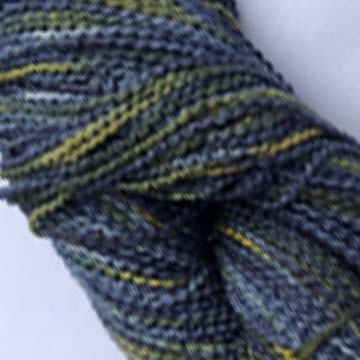
Dyeing Kathryn’s Cupcakes … with Annette’s Topping
In this fun dye class we will learn about several dye types including fiber reactive dyes. During class we will dye a “cake” of yarn into a variegated, one-of-a-kind skein using a dyeing technique developed by Kathryn Weber of Blazing Shuttles. Open to all participants with interest in creating gorgeous yarns
Students should bring: a wound (ball winder ball) of prewashed “cake” of cellulose fiber yarn (cotton, rayon, silk, tencel or bamboo).
Materials fee: $15, includes all handouts and dye supplies.
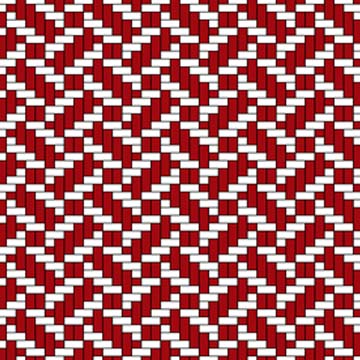
How Do I…? Learning to Understand a Draft
This class is for beginners and intermediate weavers who want to understand how to read, interpret, and create a weaving pattern or draft. Using this information, you will be able to detect errors in patterns as well as design your own unique drafts. Come and be ready to increase your proficiency and confidence. Beginner weavers and those wanting a better understanding of the “endless possibilities” of weaving patterns
Students should bring: graph paper, woven items, ideas of a weave structure you would like to draft.
Materials fee: $5.00, includes handouts
Bonnie Tarses
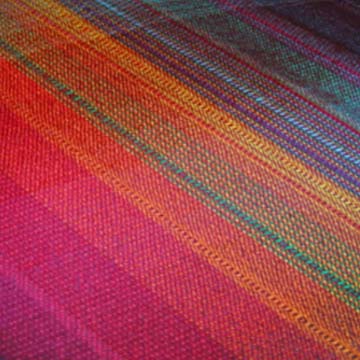
3 Workshops in 1: Color Horoscope Weaving/Woven Words/Almost Ikat
Come join in the discovery of 3 unique methods of color blending developed by Bonnie over the past 4 decades, as demonstrated in a spectacular array of examples. Students will use Color Horoscope Weaving as their primary focus, which means they will arrive at the workshop with their loom warped and ready to weave with a personal Color Horoscope. Be advised that this workshop begins at home at least 1 month (or hopefully 2) before the actual workshop with 1-on-1 email or Zoom instruction for setting up an individual unique warp. During the workshop, students get a taste of Woven Words and Almost Ikat, providing inspiration and ideas that will last for years. Students must either be able to warp their loom at home or have someone help them. Ask about new advanced challenges if you have already woven a color horoscope.
Materials fee:
$50, paid upon enrollment directly to Bonnie *see additional student requirement
$10 paid at workshop, supplies for Woven Words and Almost Ikat
Instructor will provide:
• A personal winding draft based on birthdate, time of day and place of birth
• Instruction on how to select yarn and how to interpret the draft and wind the warp
• Handouts and materials for designing warps in Woven Words and Almost Ikat
Students should bring:
• Portable warped loom (capable of weaving 16 in., with 400 heddles), threaded plain weave
• Weft
• Shuttles (and whatever weaving tools you require)
• Both cloth and paper scissors
• Ruler
• Pencil with good eraser
• 5 hanks of cotton embroidery floss
Maximum 16 students
Additional Student Requirement:
*Each Color Horoscope student must contact Bonnie upon enrollment btarses@gmail.com and supply her with an accurate
1. Birth Date (month, day, year)
2. Time of Day (hour and minute, if at all possible)
3. Place (city/town, state/province, and country)
Bonnie will then create a personal winding draft based on this information, In addition, she will send instructions on how to select yarn and how to interpret the draft and wind the warp. In the event that the conference is canceled, the workshop is canceled, or you are unable to attend for whatever reason, you will still be able to weave your horoscope weaving!
Note: if you have been considering the Bonnie Tarses Horoscope Weaving pre-conference MAWS 2022 class, but don’t want to drag a loom to Helena, you can take the class without your loom. You will learn not only about the Horoscope color plan, but also the Faux Ikat and Woven Words techniques. Bonnie is a fabulous teacher and you will come away with a whole new excitement about color possibilities!
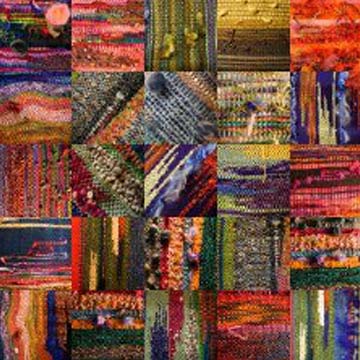
Spontaneous Weaving from the Heart
A hands-on day of exploring free weaving with a gifted instructor inspired by the Saori philosophy. This is a time for individuals to break free of weaving boundaries and rules, and have a jolly good time! Participants will bring a warped loom (per instructor’s directions) and LOTS of small weft bits, “anything really…the wackier the better!”
All levels are welcome. Must come with a warped loom, ready to weave, but first-time weavers are welcome.
Students should bring: Already-warped loom with 10/2 cotton (black or jewel-toned); 3 yard warp, sett at 12 epi., warp width 6–9 inches; shuttles, scissors, and whatever weaving equipment necessary. If you have a shuttle that takes bobbins, have several bobbins and a bobbin winder. Bring LOTS of weft—small bits of leftovers, anything really, the wackier, the better! (Bonnie will bring her stash, too!)
Materials fee: $10.00
“I believe it is practically impossible to weave something ugly since weaving by its very nature is beautiful.”
—Bonnie Tarses
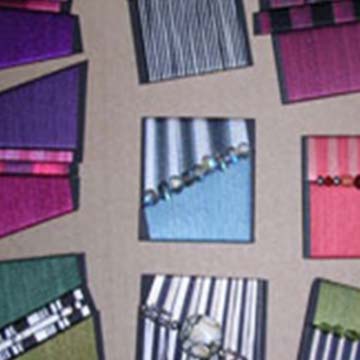
Wrapped Ikat-dyed Silk Jewelry
Many have seen and coveted Bonnie’s silk Ikat-dyed jewelry. Now you have an opportunity to learn how to make it! You will have fun with color while learning how to make perfect wrappings and “flexing” your creative muscle. Students will be using custom-dyed, space-dyed, and ikat-dyed fine silk yarn to complete several brooches. Attention to detail, good manual dexterity, and perfectionism with infinite patience are all good attributes to have for this class.
All levels welcome and especially those who love attention to detail!
Students should bring: small, sharp scissors, magnifying glasses, and an Ott light for close work, unless you have great eyesight.
Materials fee: $1.00 per unit for supplies used in the workshop.